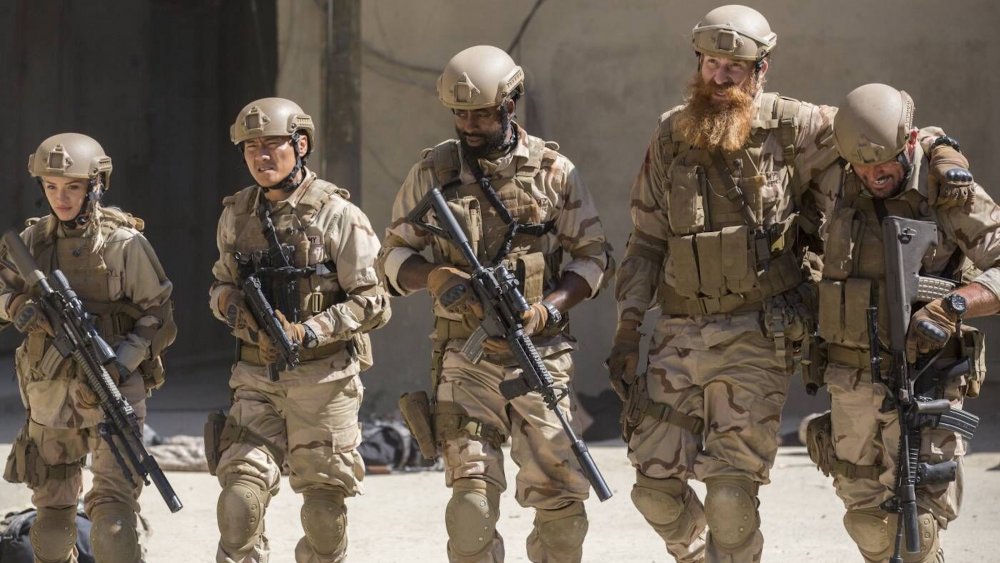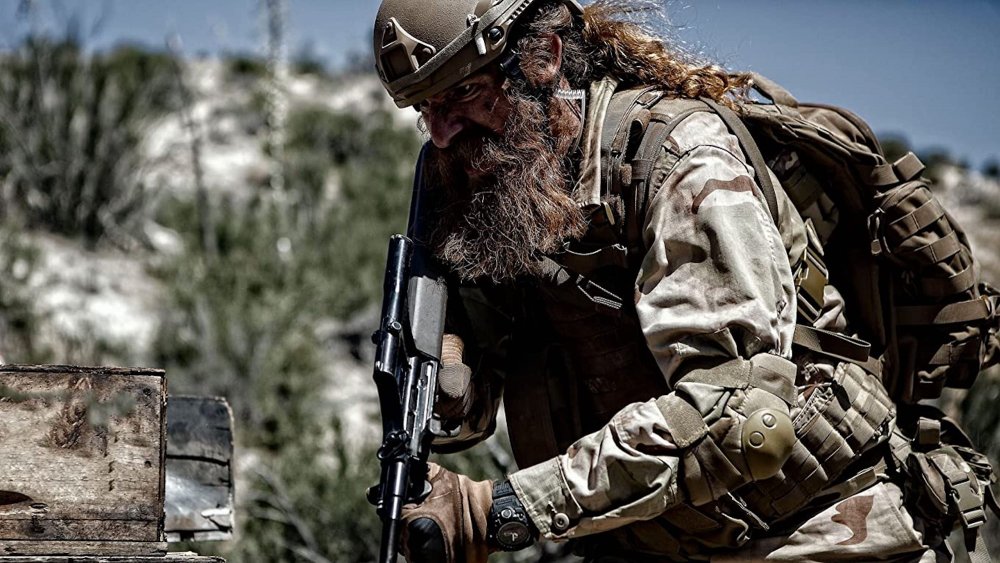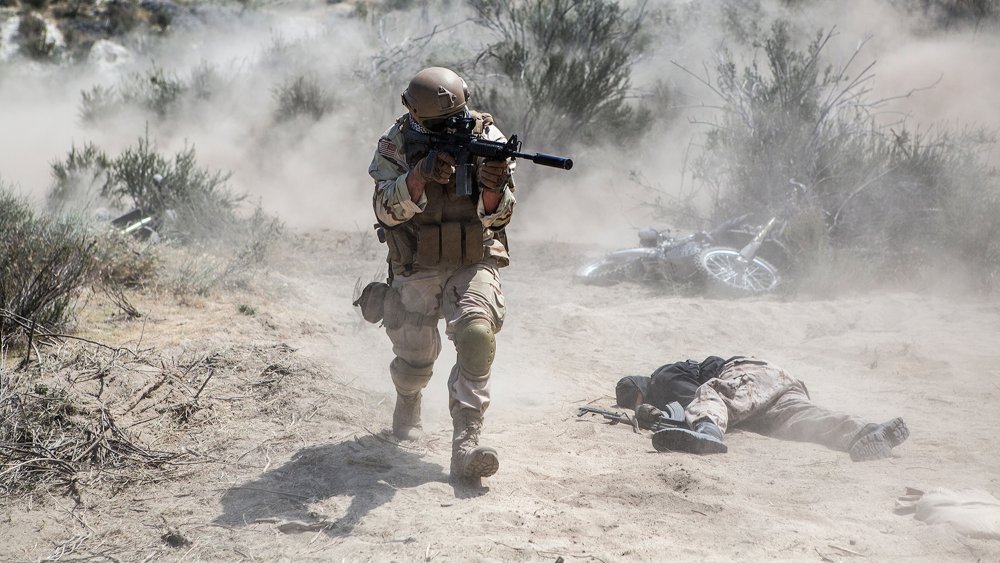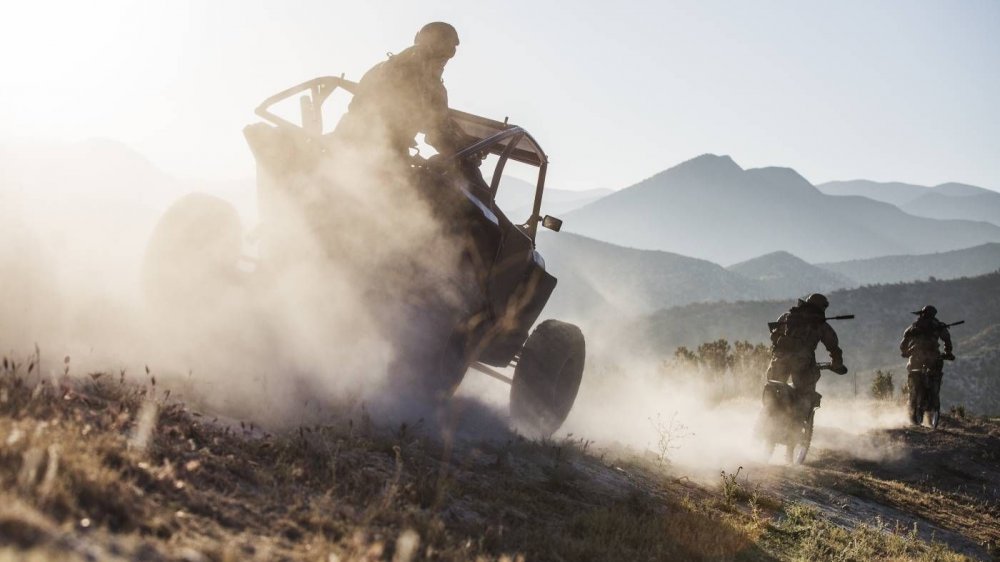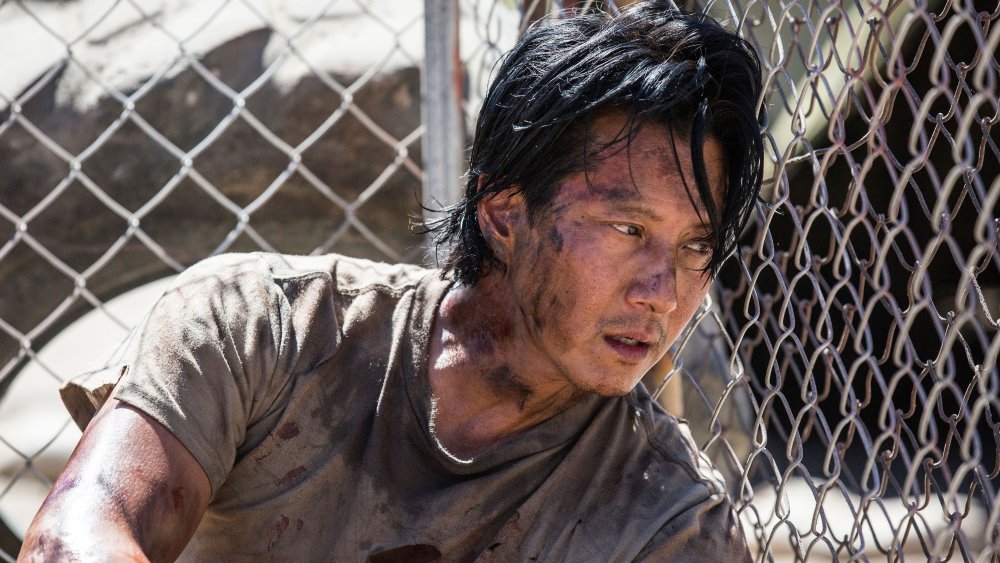How The Rogue Warfare Team Made The Action Trilogy - Exclusive Interview
The entire Rogue Warfare action trilogy was shot in just 45 days at only two locations in Southern California. Yet despite the budgetary constraints and time restrictions endured by 5150 Action Productions, the movies became surprise hits on streaming services in 2020. Rogue Warfare: The Hunt, the second installment in the franchise, even broke into the Netflix Top 10.
Rogue Warfare: Death of a Nation concludes the overarching story about a group of elite soldiers battling against terrorists, played by an ensemble cast that includes Will Yun Lee (The Wolverine) alongside stunt performers, cinematographers, and other crew veterans turned actors.
In this exclusive interview with Looper, writer/director Mike Gunther and writer/producer Andrew DeCesare (themselves behind-the-scenes crew member veterans of huge Hollywood franchises like Bad Boys and Fast & Furious) discussed the challenges involved with getting the Rogue Warfare movies completed. Spoiler alert: precision planning and "speed chess" style dedication worthy of real-life elite soldiers were essential to getting the job done.
Why audiences love the Rogue Warfare trilogy
The Rogue Warfare series has done exceptionally well on Netflix. What do you think is resonating with audiences?
Andrew DeCesare: People are very much in this mindset right now with COVID of just wanting to have 90 minutes away from everything that's going on. Whether it's their personal finances or political, whatever, I think that people are a lot more open to just kind of different content. And yes, it's not as [big] as Transformers, still, I think it provided them the entertainment and the escape they wanted. And it's new. With everything that's going on, Hollywood's still pretty much closed. I think both of those things combined helped, but I'm also optimistic in that I believe that the third one will make it into the [Netflix] Top 10 as well. I think there's this weird cult thing that's kind of going on right now. We've received a lot of emails. A lot of people have reached out and whatnot. So we're optimistic to see how the last one turns out.
Mike Gunther: And I think the other thing is, it's a throwback to kind of '80s action. There are no visual effects. It's just straight raw action. To be honest, I believe we are so overloaded with the Marvel/Disney superhero movies that are just so over the top CGI and all that. I think it's kind of a fresh take on that as well, which I think resonated with people.
The challenge of shooting all three Rogue Warfare movies back-to-back
Tell me about the blessing and the curse of shooting three movies at the same time.
Mike: I mean, when you have no money, let's just be honest, you have to kind of reverse engineer how to get something off the ground. Andrew and I got into a room and said, "Hey man, if there's a way to do it, let's figure out a way to do it." I think you've kind of got to wear both hats at the same time because you're limited with money, but you still want to be creative and do something authentic.
I think that was our biggest challenge, but I think once we laid a roadmap of how we were going to do it, we just were so prepared when we started shooting. We knew we just couldn't get off of that map. It was kind of like speed chess; time is running, we got to move. We didn't have enough money to negotiate or have it bail us out of problems. We were like, "This is our game plan. We're climbing to the top of this mountain, and that's it, guys. We're going." And there was no rethinking it because of a tough day or something. I think that was the biggest thing for me.
Andrew: From the producing aspect, it was a massive challenge. I mean, we all co-wrote all three of them as well, and I remember the first draft was like this sick $10 million feature that was going to just be amazing. After we went through the process of getting cast attached and doing presales at the different film festivals with our sales agent, it just wasn't realistic. It wasn't in the cards. And they're like, "Listen. You guys are going to get like 750 grand for the actual production budget of this." So we went back into the room in our office, we sat down and rewrote it specifically, shot by shot, scene by scene. Mike and I just took the entire trilogy apart and made it to where Blue Cloud Movie Ranch in Santa Clarita and Polso Rosa Ranch in Acton could basically house every single scene across three scripts.
So there were so many layers of challenges of not only pushing the creativity but then before you even got to the starting gate, it had felt like we've made three movies. It's tough too because we've done huge movies, and it sucks when you have directors that just have... There's no way they can fail. They have every toy at their disposal, the best Academy Award-winning costumes. When it comes down to us, it's Mike and I and our other producer, Mike Day, sitting in a room at midnight, trying to figure out, "OK, what can we splurge to get the camera car for one day? What can we do this and that?"
From the producer side, we tried our best to give Mike as many tools as possible. I think we wrapped four hours early on day 45, and it was insane.
The most complicated stunt scene in the Rogue Warfare trilogy
What was the most complicated or the most dangerous stunt that you put together for the Rogue Warfare movies? And then the same question for all the stuff you've done.
Mike: Well, just talking Rogue, the most difficult, because there are a lot of moving parts, was probably the opening of Rogue Warfare 2. Because you're dealing with vehicles, and we're on a fire road. I mean, the challenges of just getting that with no one driving off the side of a mountain and dropping 700 feet... And you got a small window of light that you're trying to get in the morning, and then you got to [film] 10, 12 [script] pages a day to even make your day. Otherwise, it's a domino effect, and everything starts collapsing.
The number of people that we were constantly having to redress and move to this place, to be able to repurpose them doing stunts, and then adding the vehicles with camera car and all that for the day, you just have a lot of people that, you don't necessarily have the best, because you don't have money. So you're using the hungry guy that wants to be there, but who might not have the most experience and you're going to trial by fire a little bit.
But everyone rose to the occasion. I think it made us all better. So that was what's at stake every day, but I think that's what was so difficult and dangerous at the same time.
As far as other movies, you could pick any movie. You can pick a [Michael] Bay movie that's just serious action with a crazy amount of money, or a Fast & Furious.
I mean, those are big, big action sequences that you're prepping, but the payoff is massive, like the opening of Fast Five, or a sequence in Transformers: Age of Extinction, on the test track. Those are just big sequences, but the same result happens if a guy misses his mark there: he's also going home early. Do you know what I mean?
Going home differently than he arrived.
Mike: Right, which we don't want [to happen] on any movie.
Will Yun Lee, Jennifer Garner, and other stunt savvy performers
I did a set visit in Vancouver to Elektra several years ago and I see that you did some fight coordinating on that. I loved the fighting in Elektra.
Mike: Oh, thanks. I've kind of worked my way through the ranks. I started as a stand-in on my very first movie, all the way up to now directing and producing.
You also worked on several of the Joss Whedon-produced TV shows, like Buffy the Vampire Slayer, Angel, and Dollhouse.
Mike: Yeah, I was just a stuntman. You really learn your craft that way, on both sides of the camera.
Having worked different jobs on productions undoubtedly helps as a director, right?
Mike: Yep, it really helps. Like I always say, I think it's the same tree, just different branches. So it's a different branch, but it's just a separate branch on the same tree. Your goal is to make the coolest, [most] authentic movie you can with what you have. It helps to have a producer like Andrew that sees that from all aspects. Otherwise, you can just have a guy that's just dealing with money and is not creative. Sometimes we were faced with situations that we had in our head that we wanted and then realized we didn't have the money, and we came up with an idea based on the challenges of not having money, and it turned out to be a better idea.
I often point to the Halloween movies. The original's the best, and that was the one that was made for no money in a very short period of time on basically the same block in Pasadena. The limited resources, I think, in some of those instances helped create some brilliance.
Mike: So true. Right. Yeah.
In terms of actors that perform some of their stunts, which actors surprised you? As far as like, "Oh wow, this actor could be a stunt performer if insurance would allow it."
Mike: Will Yun Lee, he's an amazing actor, but he's also very physical, and he comes from a physical background. I met him early in his career. He would definitely be a standout. Rory Markham did an amazing job physically, which I think some guys just have that kind of feel about them, and it worked in that role. It was a very physical role.
What about from other stuff you've worked on? Who stood out?
Mike: Well, I mean, I got to tell you, Jennifer Garner, probably to this day is one of my favorites. She was the first to show up, last to leave. I've never seen a person work harder, and she was all about, "I want to do everything myself." Channing Tatum [was] the same way. I think when we did the fighting, he wanted to be in every scene. So there are people out there that are just like, "Nope, I signed for this movie to do this job."
Rogue Warfare, Rogue Warfare: The Hunt, and Rogue Warfare: Death of a Nation are now available on Netflix.
